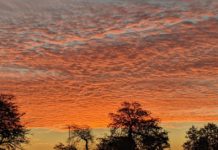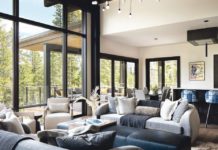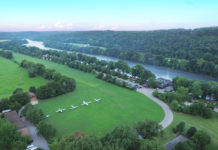Sean Burke made his name as a brewer when he burst onto the Portland beer scene in 2011 and helped build The Commons Brewery into a supernova.
He cemented his status with a move in 2017 to Von Ebert Brewing, where he blew up the notion of the sophomore jinx by creating the start-up brewery’s heralded barrel-aging and blending program.
For his third act, Burke in late 2020 set off on the personal dream trail, crafting beers true to his own style as co-founder of ForeLand Beer of McMinnville, whose initial offerings delivered the first taste on a promise of what was yet to come and earned it Best New Brewery at the 2021 Oregon Beer Awards.
In that span, he won more Great American Beer Festival and World Cup medals than his years spent as a professional brewer, a dozen trips around the sun that saw him rise to the top echelon of brewers in a city flush with great ones.
And then, just like that, Sean Burke was done.
In October, the 44-year-old announced he was leaving not only ForeLand Beer but the brewing industry itself, exiting at the peak of his career in favor of pursuing longtime passions: the outdoors and wildlife photography. Burke has begun working with Get Elevated Media of Vancouver and Portland, where he will do photography, content creation and social media management for the marketing agency’s clients, hoping eventually to focus on ones specializing on the outdoors.
“Sometimes in life you get to a fork in the road and you think, ‘I’m going to try going left.’ And I just went left,” said Burke, who recently sat down with The Oregonian to discuss his career change. “And it’s a great thing.”
The sudden about-face of one of Oregon’s most respected brewers has its roots in two powerful forces: the difficulty of today’s brewing industry combined with the relentless tug of a compass needle pointing to the possibilities of a new idea.
“Honestly, I think more people should do it if they have the capability and means to do it,” he said. “Don’t let fear of the unknown, don’t let all the other things get in the way of following the path that you want to be on.”
“ADMITTEDLY IT’S HARD. IT’S NOT EASY”
Call it the pandemic and the ensuing struggles for a nascent business.
Call it not getting the same reward out of an industry that used to give more than it took.
Call it the desire to turn passion into profession.
The motivations are complex when someone hangs it up at a time when, to all the rest of the world, things look to be on track. That certainly was the case for Burke.
“We started ForeLand during the pandemic, hoping we would move on from that quickly and the world would get back to ‘normal’ soon enough. And it didn’t,” he said. “The service industry has taken such a huge hit. And so for me it was kind of the beginning of this year where it really started to hit home. It was just this constant uphill battle.”
He spent much of 2021 building ForeLand’s second location, The Study, in Southeast Portland. After it opened, COVID-19 delivered its Omicron surge, and everything shut down — again. As ForeLand’s co-owner, Burke reduced his salary in order to keep a dedicated staff employed. But at some point he asked himself, what am I doing here? Is there longevity in this?
“It was kind of the beginning of where I started to say, this isn’t what I want out of it,” he said. “I hesitate to say this isn’t what it used to be because nothing is. But when you put so much in and you’re not getting it back out, you have to evaluate it and say, well, OK, am I doing the right thing?”
David Sanguinetti, Burke’s business partner and fellow ForeLand co-founder, said he wasn’t surprised at Burke’s decision and had “seen the writing on the wall” that Burke had lost his enthusiasm for the beer industry.
“We had a good foundation, a good brand, so it was like, let’s figure out a plan,” Sanguinetti said. “He did three months of prep, so we were ready to go when he announced his resignation.”
Burke remains a co-owner at ForeLand, though he has no active role in its operation and takes no salary.
Sanguinetti said the brewery is in good shape and moving forward with brewers Brandon Barclay and new hire Noah Palmer. Sales at the Portland location have been slow, but the McMinnville location is doing well, as is distribution.
“I’m super pleased with the beers the brew team is putting out,” Sanguinetti said. “We recently re-signed our distribution deal with Block 15, so we’re just going forward with making the best beers we can. I’m confident in ForeLand as a brand.”
At ForeLand, Burke said he had been focused on making beer styles he cares about because he sees an increasing sameness in what comes out of today’s craft brewhouses.
“A big thing for me is that a lot of the industry has gravitated towards this kind of homogenous thing, where everybody’s chasing the same three trends,” he said. “You look at a taplist and it’s just the same beers a lot of times, and I miss the days you could have a small craft brewery and specialize in certain things and find some success in that.
“And I don’t feel like that’s in place here in Portland,” he said. “There’s an embarrassment of riches as far as craft beer goes here, but you would think even more that that would lay the foundation for having different specialties.”
An example: Even highly respected specialists like Upright Brewing are making IPAs now, he said.
“I miss that,” he said. “That’s how I started my career, being in a brewery like that, and it really allowed me to be better at those beers rather than trying to figure out how to make 18 different styles of beer and do it pretty well, as opposed to doing one or two very well.”
His advancing years haven’t helped either, Burke said, though he quickly added that he doesn’t see a midlife crisis, he sees a “midlife blossom.” There’s a reason you don’t see a lot of 50-year-old brewers, he said.
“It’s hard work,” Burke said. “I’m not afraid of hard work, but you have to have the reward that comes from that hard work, you know? Otherwise you’re just working yourself into the ground, and that just isn’t appealing to me.”
He also said the craft beer industry isn’t always the best at “taking care of its people as far as mental and physical health … it’s got a lot of room for improvement in that sense.” And his desire for health and well-being informs his thoughts about his future.
“Just not constantly being around alcohol,” he said. “Not that I feel like it’s a major issue with myself personally, but I just want to be able to make sure I’m making smart decisions, and if I’m out hiking around in the woods, that’s great for me.”
Burke said the most common reaction to his decision has been support — including those in the industry who told him they very much relate and have considered doing the same.
That rings true, said Sam Holloway, a Portland-based brewing industry consultant who has been working with brewery owners around the globe since 2015.
“I get asked all the time, ‘Sam, how can I quit? I’m working twice as hard for half the success, and there seems to be no way out,’” Holloway said.
Many craft brewers turn their love for making craft beer into a business, Holloway said, but with success their job moves away from the creative aspects of brewing into running the business.
“After about 10 years you start to ask yourself, is there an end in sight and, if so, how do I get there?” he said. “Gone are the days of brewery buyouts, so if you’re not going to have a financial windfall, you have to find joy in other aspects of the business or get out.”
THE FOREST IS CALLING
Adam Burke and his brother Sean, three years his junior, grew up in the woods. Their parents split up when Sean was 2, and they moved around Oregon a lot. Mom would take them camping all the time, Sean Burke said, and they saw a lot of the state and its landforms. He would go fly-fishing whenever possible with his brother, now a successful artist whose dark surrealist works are also influenced by nature and its creatures.
Being in the wilderness stuck, and it “stuck even more the last 10 years,” Burke said. “It has really blossomed into, oh, this is exactly the place I want to be the most. It’s where I feel the best.”
10
A gallery: Sean Burke’s nature photography
He sees his career switch as an opportunity to incorporate those interests into his work. After Burke made his career news public, Matt Ellis, co-founder of Get Elevated Media, contacted him.
“I knew where he was coming from, I knew how respected he was, and I saw what he was doing with his photography and how he wanted to expand that in a different genre,” Ellis said. “So I met with my business partners and decided to reach out to him and take a risk on him.”
Ellis initially thought Burke’s background in craft beer might be a way to expand the craft brewery client portfolio of the marketing agency, which works with Grains of Wrath Brewing. But he also sees the very real possibility of Burke working with a range of clients, including outdoors-themed companies.
“If anybody follows him on his social profiles now, you’ll see he has a knack, he has an eye, but he also has a love of the outdoors,” he said. “If we can find the right companies that have that same ethos, the sky’s the limit with him.”
A more personal communion with nature involves Burke’s new YouTube channel, Prolific Northwest, in which he takes viewers along on his camping, flyfishing and exploration adventures across Oregon’s rivers and wildernesses. Burke, also a musician who performs with his traditional country band, Golden Promise, writes and scores the music for each episode.
“It’s about this giant creative expression and how that makes me feel,” Burke said. “It makes me feel great to be able to do that on the side and have it for yourself, but then also it helps me as a professional get better at what I’m doing.”
The focus is on a slow-paced, thoughtful and deliberate approach to being in nature. In the most recent episode, Camp Food, he and wife Jennifer Stefanick prepare and cook meals they share in their makeshift campsite.
Stefanick, he said, has been “incredibly, incredibly supportive and mildly stressed because it comes with financial issues. But I don’t think I could have done it without her support.”
Burke and Stefanick have pegged his future to a vision that combines his interests and his expertise, a place where he can make his home office at the side of a river or the inside of the camper atop his pickup.
“What will be really exciting is if I can figure out some sort of outdoor-based client or clients moving forward and to be able to say, OK, my experience and knowledge of the area and the time spent out and about can benefit you,” he said, “but also it affords me the ability to be out and about while still making a living.”
And if taking that left fork in the road is a dead end?
“You can always come back and take the right fork if the left one isn’t working,” Burke said. “Admittedly, it’s hard. It’s not easy. But it’s one of those things where I’ve never felt more sure of something. I’ve never felt more at peace with a decision.”
— Andre Meunier; sign up for my weekly newsletter Oregon Brews and News, and follow me on Instagram, where I’m @oregonianbeerguy.
Credit: Source link






























